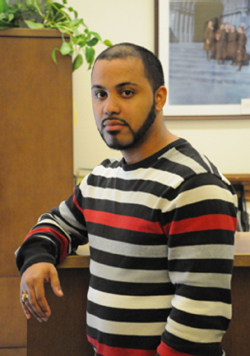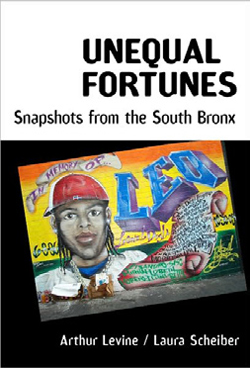TC At Work: Juan Carlos Reyes
People come to TC via many paths, but in the case of Juan Carlos Reyes, assistant to President Susan Fuhrman, TC quite literally came to him.
People come to TC via many paths, but in the case of Juan Carlos Reyes, assistant to President Susan Fuhrman, TC quite literally came to him.
In 2000, Arthur Levine, who was then TC’s president, visited the Bronx apartment in which he’d grown up. He met 14-year-year old Carlos Pilarte, who lived there with his family and who also happened to be best friends with Reyes, whose family had moved to New York City from the Dominican Republic when Reyes was two. Levine eventually met Reyes on a basketball court, and the two hit it off instantly.
Levine’s visit to his old neighborhood was more than a walk down memory lane. Together with Laura Scheiber, a TC doctoral student in Comparative Education, Levine was planning a book that would illustrate the changes that shook the area in the years after his boyhood, when many blacks and Latinos moved in, many Eastern European families left, economic depression set in and landlords began setting fire to their own buildings to collect insurance money. Between 1970 and 1975, some 30,000 buildings were abandoned or burnt down.
Levine and Scheiber’s book, Unequal Fortunes: Snapshots from the South Bronx, was released earlier this year by TC Press. The result of 10 years of research, it illustrates the many challenges that Pilarte, Reyes and their friends faced growing up in an area with a 50 percent high school dropout rate, high levels of gang activity, violent crime and drug abuse, and a scarcity of social services.
The book also movingly describes the turns of chance that determine survival in such a setting. Reyes, who was 15 when the project began, graduated from high school in 2004 and studied at Mount Saint Mary College, before transferring to Baruch College as a political science major. He will graduate at the end of this semester. Pilarte, too, pursued higher education. But a third friend, Leonel Disla, was fatally shot by police as he was trying to break-up a violent street fight after a Halloween party. Disla was carrying a knife when he was killed.
“My story and Leo’s story are so similar,” Reyes says.
From the start, Reyes felt a kinship with Scheiber and Levine, opening up about being stopped constantly by police when walking down the street and walking through metal detectors to go to class.
Because of Levine’s busy schedule, Scheiber took the lead on researching the book and spent most of her time with Reyes and his friends, talking to them about their lives. Her questions ranged from the profound to “Can I open your refrigerator?”
“At first, I thought it was really weird,” Reyes says, “but eventually I got used to these types of questions, and we developed a friendship.”
Reyes often skipped class to play dominos—“anything to stay out of the classroom”—and struggled with the heavy influence of the streets, the ubiquitous presence of gangs and drug deals on every corner. After a conflict with a security guard that resulted in expulsion, Reyes started to think differently about his circumstances.
“I started questioning myself,” he says. “I have two great parents who have made many sacrifices for me.”
Scheiber introduced Reyes to Peter Dillon, a TC alumnus who was then principal of the Heritage School, a high school in East Harlem founded by TC faculty member Judith Burton and supported by TC Trustee Joyce Cowin. Dillon, who now works as the Superintendent of Stockbridge schools in western Massachusetts, told Reyes: “Sometimes you don’t need a second chance or third or fourth—you might need a fifth or sixth.”
“That was so motivating to me,” Reyes says.
Reyes thrived at Heritage, a small school that afforded him more one-on-one attention. “I found many mentors there, people who made me see new possibilities.” His martial arts teacher, Rachel Rivera, made a particularly powerful impact: “She never judged me. She only wanted to see me do better.”
Reyes came to TC in 2006, just as Levine was transitioning out of the College. “What I like most about my job is networking with all different kinds of people—vice presidents, trustees—every day is a different learning experience,” says Reyes, whose daily duties include handling Fuhrman’s schedule, petty cash, accounts payable and many ad hoc challenges. There are plenty of special occasions, too, such when the President of the Dominican Republic visited TC last year. Reyes served as an usher. “That was pretty cool,” he says.
Once Reyes graduates, he plans on taking more time to enjoy his friends and family, including his two-year old son. He’d also like to get back into martial arts.
For the future, Reyes, who once envisioned working as a doorman, has his sights sets on a master’s degree in public administration and ultimately working for a community-based non-profit. “I want to make a difference in neighborhoods like the one I grew up in,” he says. He echoes the solemn plea Scheiber made at the end of the joint BookTalk the two gave in Gottesman Libraries this past fall: “We can’t lose anymore Leos.”
Published Monday, Dec. 20, 2010

